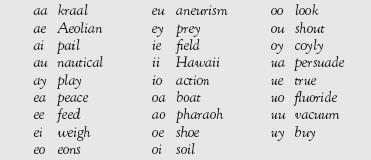The Complete Guide to English Spelling Rules (50 page)
Read The Complete Guide to English Spelling Rules Online
Authors: John J Fulford

Note that word blends are new words created by putting together parts of other words without using hyphens,

G
enerally speaking, names do not follow spelling rules and we should not expect them to do so. Many names have been modernized and anglicized over the years, but there are just as many that retain their ancient spellings. Such names can be both an inconvenience and a matter of great personal pride to their owners.
The names of foreign countries and cities do not always translate well, especially if they must be adapted from a different alphabet. When we browse through old atlases, we can see that the spellings of many cities and countries have changed a number of times over the years.

There are difficulties involved when we do try to make a foreign name fit English spelling. Sometimes the name is anglicized, and
Italia
becomes
Italy,
or
España
becomes
Spain,
but usually we attempt to produce something that is close to the original, no matter what the spelling. If we applied strict spelling rules to
Iraq,
for example, it would have to be
Irack
because in English the
q
may not stand alone and a
k
does not usually follow a short vowel. But
Iraq
it is.
Over the centuries, a whole host of names, both English and foreign, have become part of our everyday language. Thanks to Louis Pasteur, our milk is
pasteurized.
Thanks to Captain Charles Boycott, we
boycott
what we don’t like. Thanks to a Cervantes hero, we consider some things
quixotic.
Thanks to a titled Englishman who wouldn’t stop playing cards to eat his dinner, we eat
sandwiches.
There are quite a few fascinating books on this subject. Most of these name-words lose their capital letters as they cease to be proper nouns. The element
einsteinium,
for example, has lost it, even though the word
Fahrenheit
still retains the capital
f.
Whether the spelling changes or not, whether the pronunciation changes or not, another useful word has been acquired and yet another exotic jewel has been added to that treasury of words that we call English.
W
hen we study English spelling, it is inevitable that we will encounter one or more technical terms. While the spelling is no great problem, the meanings of the terms are often confusing.
A
homograph
is a word that is spelled the same as another word but has a different meaning, which is usually evident in context. It may or may not have the same sound:

A
homophone
is a word that is pronounced the same as another word but has a different meaning. It may or may not be spelled the same way.

A
homonym
is a word that is both a
homophone
and a
homograph
because it is the same as another in both sound and spelling but has a different meaning.

Antonyms are words that are opposite from each other in meaning:

Synonyms
are words with the same, or almost the same meaning as other words. We commonly find synonyms in the thesaurus:

Heteronyms
are words spelled the same as other words but have a different sound and meaning:

A
diphthong
is two vowels that together create a single sound:

The
digraph
is two consonants that together create a unique sound:
